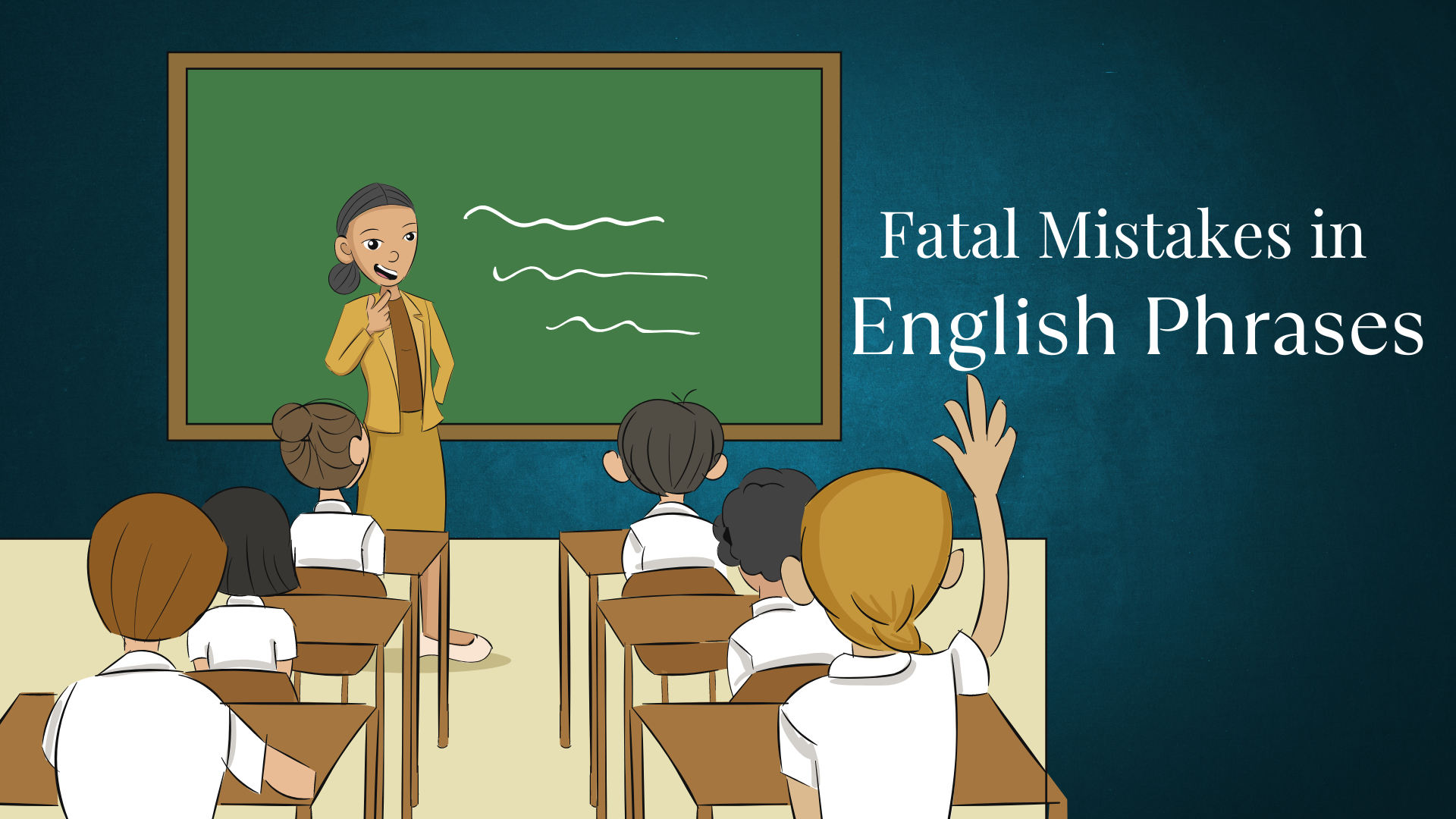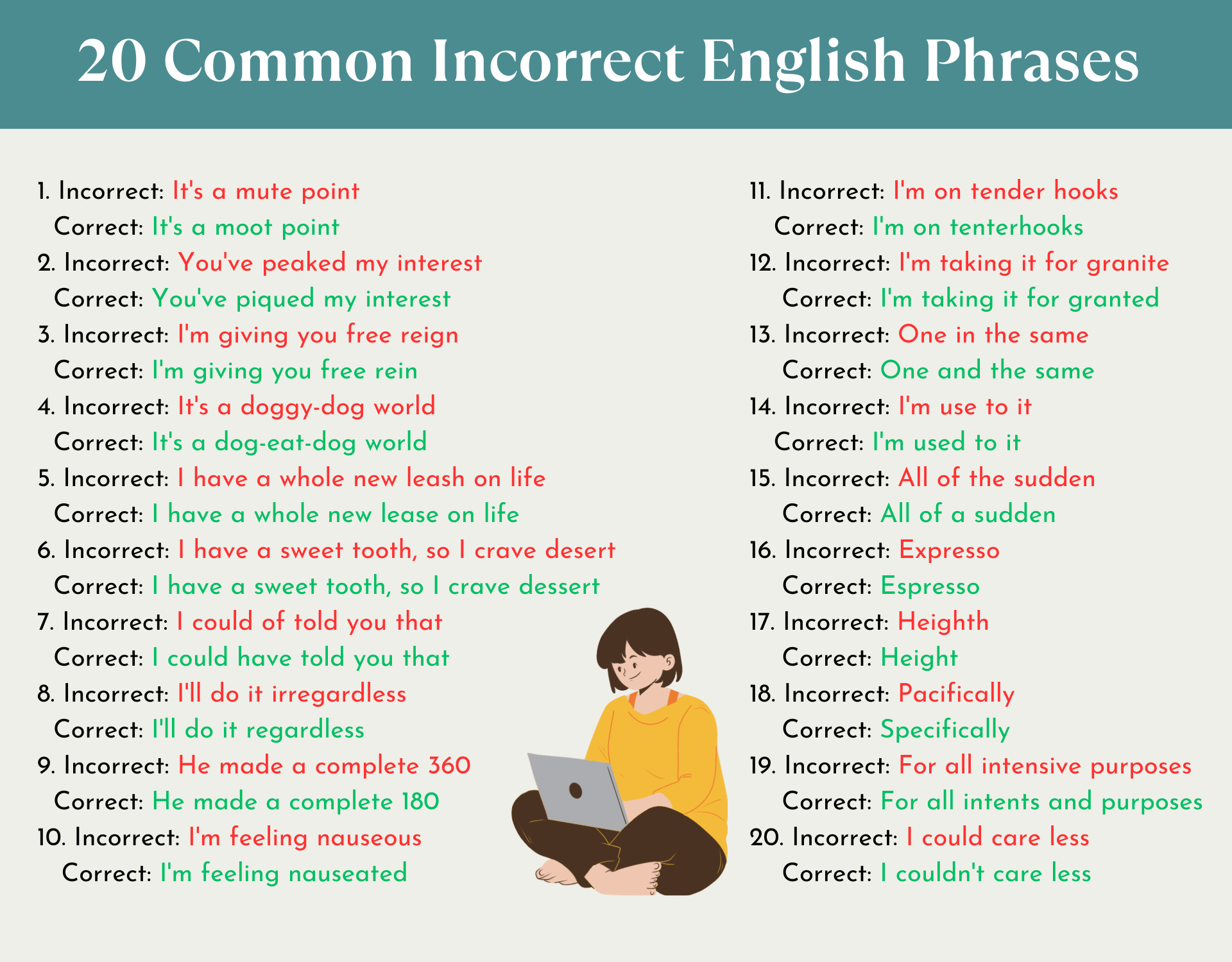
Fatal Mistakes: Are You Using These Incorrect English Phrases?
28 April 2024
By rewriteradmin
Article Writing
Everyone makes mistakes in English, but certain words are often misinterpreted or misused, affecting how we communicate through the language. These mistakes might slip into ordinary communication through colloquialism (slang), misunderstanding, or plain oversight. In this blog, we’ll look at some commonly misunderstood English phrases and provide the correct forms to help you communicate in English more successfully.
- Incorrect: “Irregardless”
Correct: “Regardless”
Explanation: “Irregardless” is a double negative that is not commonly used. So, Irregardless actually means “with regard”. But it’s best to avoid this phrase because of the unnecessary confusion.
“Regardless,” which implies “without regard or consideration,” is the commonly used and acceptable phrase.
2. Incorrect: “For all intensive purposes”
Correct: “For all intents and purposes”
Explanation: The correct phrase “For all intents and purposes” means that something is accurate or valid in every practical sense. The phrase “intensive purposes” is a common misunderstanding that does not convey the intended meaning.
3. Incorrect: “Nip it in the butt”
Correct: “Nip it in the bud”
Explanation: The right term is a gardening metaphor, implying that an issue should be addressed early on before it has a chance to grow into a bigger problem. The phrase “nip it in the butt” is a common mishearing that completely changes the meaning.
4. Incorrect: “I could care less.”
Correct: “I couldn’t care less.”
Explanation: This one is a little tricky. Both phrases are correct but have different meanings. So, use them appropriately. The correct and most acceptable phrase “I couldn’t care less” expresses complete indifference, emphasizing that the speaker has no interest or concern. “I couldn’t care less” on the other hand, indicates some level of caring, which is not the intended meaning.
Definitions of Acronyms, Backronyms | Why People Use Acronyms
5. Incorrect: “One in the same”
Correct: “One and the same”
Explanation: The right expression says that two objects are indistinguishable or identical. The phrase “one in the same” is a common mistake that changes the intended meaning.

6. Incorrect: “I made a complete 360-degree turn.”
Correct: “I made a complete 180-degree turn.”
Explanation: The phrase “360-degree turn” signifies going in a full circle and returning to where you started. The correct word is “180-degree turn,” which indicates a complete 180-degree shift or change of direction.
7. Incorrect: “Chomping at the bit”
Correct: “Champing at the bit”
Explanation: The phrase “Champing at the bit” refers to being impatient to start something. The expression comes from the sport of horse racing, where an eager horse may “champ” or bite at the bit. “Chomping at the bit” is a popular variation, but it is not the standard usage.
8. Incorrect: “I could of done that”
Correct: “I could have done that”
Explanation: The right phrase uses “have” instead of “of.” This error is frequently made due to the similar sounds of “have” and “of” in spoken English.
9. Incorrect: “Extract revenge”
Correct: “Exact revenge”
Explanation: The right expression is “exact revenge,” which means to take revenge or seek vengeance. “Extract revenge” is a common error that may result from a misunderstanding of the term “extract.”
Create Engaging Content with Article Rewriter Tool
10. Incorrect: “Case and point”
Correct: “Case in point”
Explanation: The correct phrase “Case in point” refers to an explanatory example that backs up a statement. “Case and point” is a common grammatical error that does not convey the intended meaning.
Bonus phrase:
Incorrect: “It’s a doggy-dog world.”
Correct: “It’s a dog-eat-dog world.”
Explanation: This phrase is pretty interesting and paints quite a horrible picture. The correct term “It’s a dog-eat-dog world” describes a cutthroat and competitive environment where the subjects hurt other subjects to survive and thrive.
On the other hand, the incorrect phrase “doggy-dog” could be a result of mishearing. So, if you are referring to a tough and competitive workplace, use the correct phrase instead of “doggy-dog”.
Read More What is Persuasive Writing and Why is it Important
These mistakes are just the tip of the iceberg. Countless phrases are used incorrectly in the English language. While it’s okay to make mistakes once in a while, it’s better to educate yourself by learning the correct words. Furthermore, you can make your communication skills smoother by learning the correct forms of the phrases, which is very important, especially in formal and professional situations.
Which phrases do you know that people often use incorrectly? Let me know in your comments.



